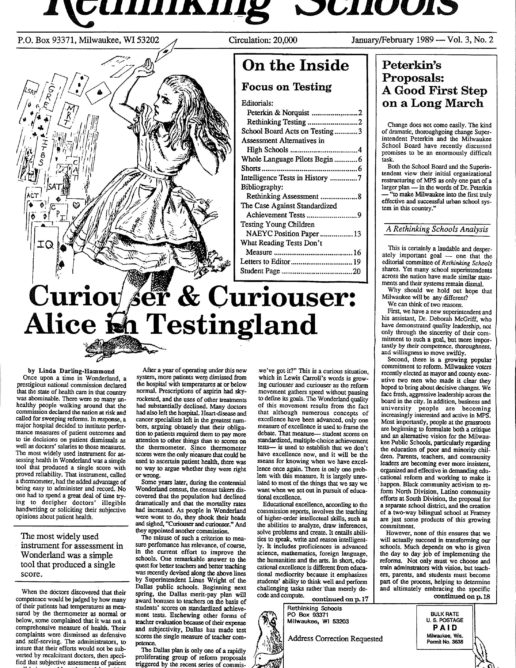Whole Language Pilots Begin
“What is a whole language curriculum?” “What materials should we be using in our classrooms?” “What do we do about assessment?”
These are some of the questions on the minds of teachers who have agreed to pilot a whole language curriculum this year in the Milwaukee Public Schools. After the Board of School Directors approved the pilot project sites this summer, a Whole Language Council was established with representatives from each school to o\l’er see and implement the project
The pilot schools are: Bryant, Clemens, Fratney, Garfield, Grandview, Hi-Mount, Lincoln Avenue, Lloyd, Palmer, Thirty eighth Street, and Victory. There are also two teacher members-at-large and a representative of the pilot school principals. With the help of the Division of Curriculum and Instruction and the support of Dr. Peterkin and Dr. McGriff, the Council has met several times to discuss issues related to whole language and resolve specific
problems related to the.MP.S project
After the first meeting it was apparent that there was a broad range of issues to be addressed. How would the limited budget given to the pilot schools best be used? Some schools were in need ·of materials while others were more concerned that their staff receive whole language inservice as soon as possible. Some schools, like Lincoln Ave. and Grandview. are starting “from scratch” this year, while others, like Hi-Mount and Lloyd, are coming into the project with several years experience with whole language philosophy and practice. In each school there are teachers in the project to whom whole·language-is a new and challenging concept. All of the schools are implementing whole language in the kindergarten and first grade, but only a few are extending the project through the intermediate grades this year.
The Council recognizes that implementing a whole language program is a complex process which will take several years. While other school systems have had the luxury of time to plan and inservice prior to implementation, MPS moved quickly into the project, equipped only with the enthusiasm and dedication of the staff involved. The Council wants to set up ways for teachers to collaborate, and to work out common definitions and curriculum guidelines. Thus far The Council has initiated three projects: developing alternative assessment measures for students in the pilot schools, publishing a whole language newsletter and providing inservice to the teachers.
Alternative Forms or Assessment
The Council decided that the current forms of assessment used in many schools are not adequate to properly evaluate the progress of the students in whole language classrooms. The Council is concerned that the assessment be fair and accurate, and more than a “checklist” of skills. Assessment procedures should be designed to help teachers evaluate the wide range of abilities and attitudes students need to move toward literacy. The Council decided that the issue of assessment would be a priority for this year and set up a student assessment subcommittee to work on collecting and evaluating alternative forms of assessment from several programs.
Process Writing Inservice
Whole language philosophy stresses the importance of teachers being role models. Children need to witness the adults in their lives reading and writing daily. The first inservice course being planned for the whole language pilot teachers focuses on – helping them become better writers and better writing teachers. Jim Vopat from Carroll College will conduct several inservice sessions for teachers on the ”Process Approach” to writing.
The Broader Picture
The whole language pilots have been launched at the same time that broader discussions are taking place in the system regarding the curriculum as a whole and reading in particular. As new system wide policies are being discussed, it is important that insights gained in the whole language classrooms help us answer the ultimate, bottom-line question: “How do we (as a school system) teach reading and writing to our students?” Undoubtedly, this question will be addressed by the two textbook adoption committees that have been formed for Elementary Reading and Elementary Language Arts. Their recommendations will have a great impact on the philosophy that will be followed by teachers throughout the system in the years to come. The direction of the Reading Adoption Committee is different from last year when the focus was on the adoption of a single basal reading system. In a letter to the textbook publishers, Assistant Superintendent Bill Larkin stated that the two committees will not evaluate materials studied last year and that “The district is particularly interested in programs that have a strong literature base and relate to integrated whole language instruction.”
It is important that the textbook committees and the Whole Language Council be in communication and that information be shared with each other. Too often in the past groups such as these have worked in isolation. This is an opportunity to gain from the insight and experience of many teachers working toward the same goal.
New Questions
As the Council continues to meet this year we will begin to resolve some of the concerns of the pilot teachers. But new questions inevitably will arise. What shape will the whole language pilot project take next year? As the students progress to the next grade, will the number of pilot classrooms be expanded? Will interested teachers not at the pilot schools be encouraged to get involved? Will the School Board allocate resources so that the project has a chance to succeed? These are questions that not only the Council, but the administration and the School Board must address in the near future.

